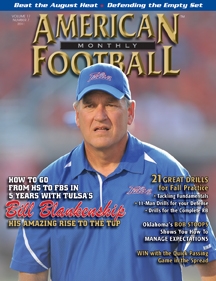Article CategoriesAFM Magazine
|
Graduate Course How does a high school coach fulfill a dream of advancing to the college ranks?by: Lynn Jacobsen© More from this issue In every profession, itís natural to want to advance to the next level. Greater prestige, higher compensation and job security are all potential rewards of a promotion within an organization or a change of employers. In football, you would naturally assume that many successful high school coaches would aspire to become college coaches, and that may indeed be the case. But even the best high school head coaches have struggled to succeed as head coaches in college football, at least at the top levels of the game. Just ask Todd Dodge. As head coach at Southlake Carroll (TX), Dodge compiled an incredible 79-1 record between 2002 and 2006 and took home four Texas 5A championships. When the call came offering him the head coaching position at nearby North Texas, he couldnít pass up the chance to lead an FBS program. Unf....The full article can only be seen by subscribers.
|
|
|||||||
| HOME |
MAGAZINE |
SUBSCRIBE | ONLINE COLUMNISTS | COACHING VIDEOS |
Copyright 2025, AmericanFootballMonthly.com
All Rights Reserved





